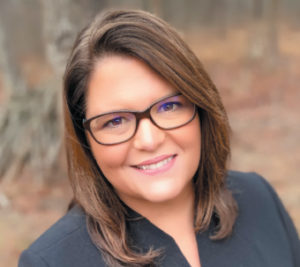CEO, Bright Futures Learning Services

By Kristen Uppercue
Jill Scarbro-McLaury grew up with a learning disability. She considers herself blessed to have parents who supported and advocated for her, doing everything they could to provide her with the care and support she needed. Because of her experience in understanding the challenges those with learning disabilities face, Scarbro-McLaury knew from a young age she wanted to help children like her who struggled.
“From about the third grade, I knew I wanted to specialize in helping children with learning challenges in a way that would make a trajectory changing impact on their lives,” she says.
Scarbro-McLaury earned her bachelor’s degree in education from Marshall University, specializing in mental impairments and physical handicaps in primary and secondary education. It was during her undergraduate experience that she began working in a home-based applied behavior analysis (ABA) program where she worked with a child named Mike who had a number of health and learning challenges, including autism.
Mike’s family routinely brought in experts from out of state to train other families and college students in how to implement ABA services. Because of this experience, Scarbro-McLaury began offering ABA services to individuals with autism in 1997 and continues to do so today.
“Helping Mike make progress in communication, play and academic skills confirmed that ABA was exactly what I was looking for,” says Scarbro McLaury. “It was a perfect combination of science, psychology and teaching that packed a powerful punch and brought truly transformative results. I was willing to go anywhere to receive the best training possible so every child in West Virginia could eventually have access to ABA’s powerful technology.”
Scarbro-McLaury attended the University of North Texas to receive a master’s degree in the world’s first behavior analysis degree program. Following graduation, she operated a private practice in Texas before returning to West Virginia as a behavior analyst in 2006, becoming the first board-certified behavior analyst in the southern part of the state. Attempting to fill the gap of available ABA services in the state, Scarbro-McLaury traveled throughout West Virginia and into Kentucky to provide ABA services while flying back and forth to Texas to see clients.
About 12 years ago, Scarbro-McLaury started a private school for Mike in her grandmother’s kitchen alongside a team of others who were just as dedicated to providing ABA services in the state. That private school has since grown into Bright Futures Learning Services (BFLS), an organization based out of Putnam County that delivers ABA services to West Virginia families. As the owner and director of BFLS, Scarbro-McLaury networks with national experts and develops strategic plans to ensure the organization offers state-of-the-art services while working to increase the facility’s capacity to serve more children.
She also founded Community Autism Resources and Education Systems in 2017 and is a founding member of the Mountaineer Autism Project, where she continues to advocate for ABA therapy.
“In addition to training and supervising the next generation of behavior analysts, I’m most excited about my work with Community Autism Resources and Education Systems and Mountaineer Autism Project,” says Scarbro-McLaury. “As a founder of these two organizations, I spend a lot of time wearing my advocacy hat, working to bring about policy change and workforce development to increase access to ABA throughout the state.”
In 2015, she helped found the West Virginia Behavior Analysis Association, which provides professionals in the state an avenue to connect and advocate for the advancement of the profession. She’s also served as West Virginia’s policy chair for Autism Speaks.
In 2019, Scarbro-McLaury received the West Virginia Small Business Administration’s Woman-Owned Small Business of the Year Award. She and her colleagues from Mountaineer Autism Project were also recognized with the Autism Speaks Advocate of the Year Award in 2012 and West Virginia Autism Society’s Advocacy Award in 2010.
“Being one of the fortunate few who was able to get help to overcome my learning challenges set the trajectory for my life,” she says. “I’ve always had to work harder to do things that came more easily to others. Remembering how it felt to have people question my intellect and ability has fueled my passion to help other kids know they are worthy, valued and capable no matter how great their challenges may be. I know that every child can—and has the right to—learn. It’s our job to make sure they get what they need so they can maximize their potential.”
Community Autism Resources and Education Systems
As the direct response to a tragedy that struck a West Virginian family who couldn’t access services for their children with autism, Jill Scarbro-McLaury, the founder of Bright Futures Learning Services (BFLS), an applied behavior analysis (ABA) clinic, was moved to bring together a group of parents and community leaders to fill the gaps left by a shortage of ABA services in the state. Together, they created Community Autism Resources and Education Systems (CARES), a nonprofit serving alongside BFLS while striving to support more children and families than the clinic can reach.
Knowing that it would take decades to fill the services gap, the CARES team supplies an avenue for families who have children with autism to connect with each other while also unifying the agencies that do provide the care families need. This allows existing support systems to work together, continuing efforts to increase access to ABA under both educational and medical umbrellas.
CARES also raises money so it can provide outreach and education for those with autism and their families. The revenue provides training resources to families in the state, supports research into the development of educational opportunities for children with autism and other learning challenges and funds efforts to train ABA providers to work in the Appalachian region.



